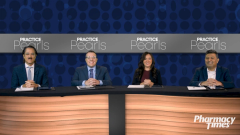
Gene Therapy in Hemophilia A: Safety, Efficacy, and the Changing Landscape
Atta Chowdhry, RPh, and Robert Sidonio Jr, MD, MSc, discuss the safety and efficacy of gene therapy for hemophilia A, highlighting recent approvals, with insights into adverse effects, immunosuppression, and the evolving treatment landscape.
Episodes in this series

Jonathan Ogurchak, PharmD, CSP: We were talking earlier about some options in the gene therapy space as well. Some of them have already been approved. What do we see in terms of safety and efficacy compared with some of the other agents?
Atta Chowdhry, RPh: Valoctocogene roxaparvovec (Roctavian), which just came out on June 28, (shows) the safety data are pretty good. There’s a slight increase in the liver enzymes, and the rest of the adverse effects are nausea, vomiting, and headache, which is probably standard for any kind of chemical you put in your body. So as we talked about it, there is an immunosuppressive therapy that goes along with being on gene therapy. The management of those adverse effects is also a key. Some people will handle [it]; as Dr Sidonio said that there is no [one-size-fits-all] glove out there. There are people who are going to be doing great on long-acting factor product like efanesoctocog alfa (EFA). Then there will be people who are going to be on emicizumab and manage it with the regular factor. And then there will be people who will be going for the gene therapy. It’s a very exciting time in the hemophilia community. I think it’s changed in the past 15 to 20 years drastically from what I’ve seen. The suffering and how good the therapies came around. At this point, a kid who’s grown with hemophilia—if you maintain their disease state properly—I think it’s just a condition that you are the only one who knows and outside world has no clue that the kid had this condition.
Robert Sidonio Jr, MD, MSc: It’s exciting. Their phase 3 results looked great. One of the only challenges [is] we didn’t see this on the hemophilia B gene therapies. Everyone’s trying to figure out why some patients will develop neutralizing antibodies and eliminate the expression. They’ve attempted to give steroids prophylactically in response to any acute rise in liver enzymes and a drop in factor VIII. And they couldn’t figure it out. What is the optimal strategy? I think over time, somebody will figure out more targeted immune suppressants compared with steroids. The problem is when you start steroids in someone older—[with] a lot of potential adverse effects. It’s very disruptive to sleep, [can cause] high blood pressure, [and] blood sugars can get out of control. I think there have been a lot of people who have [tried] to get together to come up with strategies if you have to start [the steroids]. Most people are going to be reactive. They’re only going to start steroids if they notice a loss of expression. They’re going to wean much faster than they did in the trial. I think in the trial we didn’t know. People were weaning, and you had to leave it up to an investigator. You couldn’t tell them, “Hey, why don’t you wean that a little bit faster?” That’s probably the only issue that people need to sort out. You could be that very rare, unlucky person [from whom it] just doesn’t work. You certainly have the option to go back on factor products or emicizumab. We’re hoping that somebody will figure this out. Somebody will figure out how to predict who’s not going to respond. But right now it is commercially available. What’s really exciting is if you just look at the number of injections that you get when you’re on factor compared with this—it’s like a 90-something percent reduction in factor infusions. You could potentially go months and months without giving any infusions. For someone who is getting 2 or 3 veins stuck on a regular basis…that’s something they would value.
Atta Chowdhry, RPh: There’s an 80% reduction in the annualized bleed rate. That’s also very important and key data.
Transcript is AI generated and reviewed by an AJMC editor
Newsletter
Stay informed on drug updates, treatment guidelines, and pharmacy practice trends—subscribe to Pharmacy Times for weekly clinical insights.






















